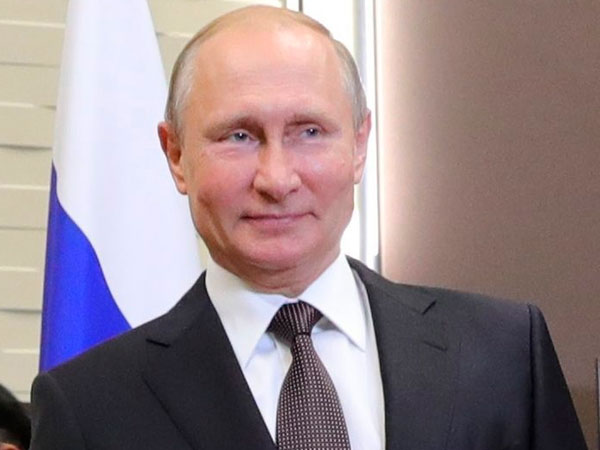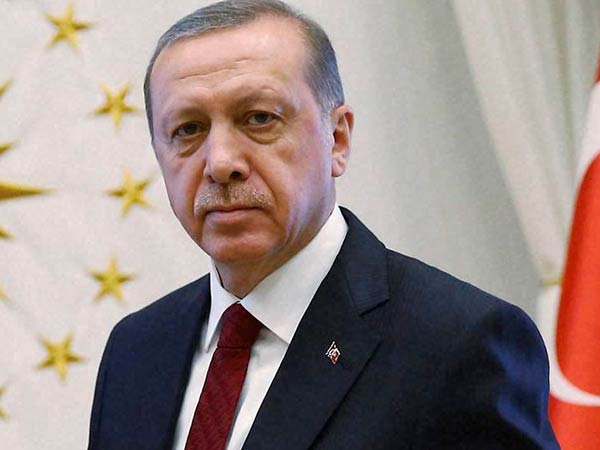
Interview with geopolitics expert Adam Garrie: ‘CPEC problem for India if ruling BJP makes it'
The month of June is exciting for the students of international affairs. While a sitting US president will meet the supreme leader of North Korea in Singapore on the 12th for talks over the latter's denuclearisation, the 18th summit of the Shanghai Cooperation Organisation (SCO) - which expanded to include India and Pakistan last year - will precede it at Qingdao in China on June 9-10. Meanwhile, earlier in the month, the foreign minister of Turkey and his American counterpart - Secretary of State Mike Pompeo - spoke over a roadmap for northern Syria's Manbij and the ongoing conflict in Syria.

Oneindia spoke to Adam Garrie, a geopolitical expert and the director of Eurasia Future, an international publication which offers analysis on important events shaping the world today, to get insights into various burning issues in world affairs. Here are some excerpts of the interview that Garrie, who makes frequent appearances on various television shows besides penning regular pieces, gave from London:
Oneindia: What's your take on the Kim Jong-un -Donald Trump summit? Will the hype produce the desired results on denuclearisation?
Adam Garrie (AG): The Kim-Trump summit is the visual centrepiece of a much wider peace process centred around direct communication between Pyongyang and Seoul along with crucial and substantial input from China and Russia. The key to the entire peace process is that it was initiated not by foreigners but by Koreans.
Kim Jong-un, whose extension of an olive branch to Seoul was picked up with sincerity by South Korean President Moon Jae-in early this year, was the beginning of an Asia authored, owned and executed peace process. The US is clearly upset that its role in the peace process is not one of leadership but one that is part of a wider spectrum of powers, the most influential and important of which is clearly China.
It is difficult to say whether a full agreement for denuclearisation will be signed at the summit, but more important even than this would be a treaty between Pyongyang and Seoul to formally end the Korean War. I suspect this will be forthcoming before the end of 2018.
Oneindia: Why do you think North Korea took the pro-peace path?
AG: Kim Jong-un has proved himself to be a master diplomat and a young leader who seeks to open his country to the wider economic opportunities of a world whose overall economic path is today influenced less by the Cold War model or the post-Cold War US-dominated model but by a Chinese win-win model of mutually beneficial bilateral and multilateral relations based on the individual needs of a particular nation.
Crucially, unlike in the Cold War era or the US hegemonic model, China does not attach political requirements to deals for economic cooperation and wider inter-connectivity. Because of this, it is clear that Kim felt that the time was right to mend wounds with the South as Koreans are a single people who in the long term will have a singular economic and geopolitical destiny.
The North Korean economy is already growing at a rapid rate; while under the radar of most observers, Kim has instigated several large building and infrastructure projects which have been generally successful in spite of sanctions.
Furthermore, Kim has introduced what could be described as early stage market-socialist economic reforms which could indeed pave the way for both a robust Chinese style economy domestically and an economic "one country-two systems" model for the Korean peninsula that could be implemented in its early stages in the coming years.
Those who underestimate the speed of reforms in North and South Koreas as a whole will ultimately be proved wrong by history. Under the leadership of both Kim and Moon, Korea is fast on a path towards a new era that will benefit people on both sides of the artificial border.
Oneindia: What could be post-Putin scenario in Russia? Will it reconcile with the West?
AG: It is virtually certain that Putin will not seek a new term in office after 2024. At such a time, I believe, a far more hardline Russian leader will become President: someone whose views are more similar to that of opposition veteran Vladimir Zhirinovsky (of the Liberal Democratic Party of Russia) than the more moderate views of Putin. While Putin has been in power for many years, he still is functioning as a transitional leader whose main objective is to rectify the many wrongs created in the Russian government during the 1990s.

He still has much more work to do but when his task is accomplished, I believe Russia will have a leader that could be a kind of hybrid of Zhirinovsky and Brezhnev but with 21st century/multipolar characteristics. For those that think that Putin's successor will be more western leaning in his approach to Russia's future, they are very mistaken.
The entire world is pivoting towards Asian models of development. As a Eurasian nation, Russia is no exception. The 1990s was an aberration in Russian history that will likely never return.
Oneindia: Your take on the Syria tussle. Are Assad's allies in Russia and Iran making him stronger or is there a shortfall in the West's policies to see him defeated?
AG: The war in Syria is winding to a close as most extremist groups have either been defeated or are on the verge of defeat. The most important powers in shaping a post-conflict settlement are Russia, Turkey, Iran and of course Syria itself. The US and its closest partners have failed in their objective to destroy the Syrian government and as a result they will have a very limited role in the negotiated settlement.
Russia and Turkey are now largely on the same page in respect of their views on a settlement to the conflict. Both countries have vowed to protect Syria's political and territorial unity and both countries have pledged to work towards a new constitutional settlement in the Astana format.
Such a settlement will likely see President Assad's Arab Socialist Ba'ath party remain in power but with the addition of new moderate opposition parties playing a role in the country's national politics while the possibility for more local control to various regions might also be on the table.
Iran would prefer the military phase of the conflict to continue until both the US and "Israel" are expelled from Syrian territory and only after that would a political settlement begin. Realistically though, Iran will likely have to compromise on this and work with its Russia, Syrian and Turkish partners in the Astana format.
Oneindia: Will Trump's retreat from multilateralism give rise to a new world order?
AG: It already has. For the developing world, countless nations are embracing a model of free trade that does not prioritise the American style corporatism but instead prioritises the Chinese style of investment and development. Furthermore, this model does not demand any particular political system on the part of a poorer partner nation in return for investment and developmental aid such as loans. In this sense, the eastern looking development model is far more popular among the developing nations than the US/IMF model which is in reality nothing but neo-colonialism of the 21st century.

In waging trade wars not only with rivals but with traditional allies, Trump is forcing many western leaning economies to look for new eastern partners. This includes, South Korea, Japan, the European Union and even Canada and Mexico.
The reality is dawning even in Berlin, Ottawa and Paris that the future of inter-connected global trade is incompatible with a US government that is alone in trying to foist protectionism onto a globalised world.
Because of this, the Chinese model may be the only option available even to neo-liberal western style economies who had hoped that they would have a US ally in creating a rival model of globalism to China. Trump is busy killing off this western globalist model and has replaced it with an ultra-protectionist one. Because of this, for those who prefer free trade to protectionism, the Asian model is ultimately the only option realistically available.
Oneindia: What could be Trump's shifting embassy to Jerusalem mean for West Asia?
AG: Trump's Embassy move has already threatened to break the already poor state of relations between Ankara and Tel Aviv. President Recep Tayyip Erdogan of Turkey is intent on rallying the Sunni Muslim world against an increasingly Islam-hating West and a Tel Aviv regime that is ever more intent on extremist anti-Palestinian measures. Now that Palestine has rejected further failed US mediation attempts because of the overt Zionist bias of Trump, Turkey is now in a key position to become Palestine's key advocate among all Sunni Muslim majority nations.

This will be important as any attempt at facilitating long-term peace in the Levant will require the cooperation of Turkey, Iran, Russia, China, the Arab League (or some variant thereof) and hopefully also India, Pakistan and the African Union.
The US has shown itself incapable of fostering peace in the region and because of this, a new multilateral model is necessary and Palestine is already actively lobbying for such a model.
Oneindia: Will CPEC make China-Pakistan alliance difficult for India to deal with?
AG: The China-Pakistan Economic Corridor (CPEC) is only a problem for India if the ruling BJP makes it so. While the recent meeting between Chinese President Xi Jinping and Indian PM Narendra Modi was a positive sign, New Delhi must work to embrace the model of multilateral Asian cooperation as this is the model best suited to India's own internal development.

With the US showing that it is capable of sanctioning both friends and rivals alike, India cannot bank on the US protecting its interests in Asia in a would-be economic or even military confrontation with China.
The key therefore is for India to embrace a spirit of cooperation and the best first step would be working to integrate the North-South Transport Corridor into One Belt-One Road so that India's own trading/logistics projects and CPEC could function as complimentary arteries in a single body of pan-Asian/global trading networks rather than as rivals. This is the win-win spirit that all of Asia can embrace to the benefit of all nations and individuals.
Oneindia: When the US is retreating from global commitments, are groups like SCO and BRICS gaining more international significance?
AG: The SCO and BRICS are more important than ever because they provide opportunities at a global level for security cooperation and investment across the developing world with a clear emphasis on a pan-Asian model.
The SCO and BRICS should work more closely as both organisations overlap in many ways even though the SCO's main focus is security and the main focus of BRICS is economic development. Such organisations can help to integrate the economic spaces of the Russia-led Eurasian Economic Union, One Belt-One Road and the North-South Transport Corridor for starters.
It is also important for the BRICS and SCO to expand. The BRICS in particular should invite countries like Egypt, Indonesia, Malaysia, Singapore, Myanmar, the Philippines, Vietnam, Turkey, Iran, Pakistan, Mexico, Nigeria, Kenya and ideally others to form a wider cooperative effort to harness the potential of multilateral development across many continents.
Such cooperation could also help to ease the conflict between Iran and the United States by giving Tehran economic options outside of the West, while other issues that could be tackled are the drug and terrorist problem in south east Asia, the India-Pakistan conflict, the war in Afghanistan and preventing the development of Takfiri terrorism from spreading in Africa.


 Click it and Unblock the Notifications
Click it and Unblock the Notifications


































